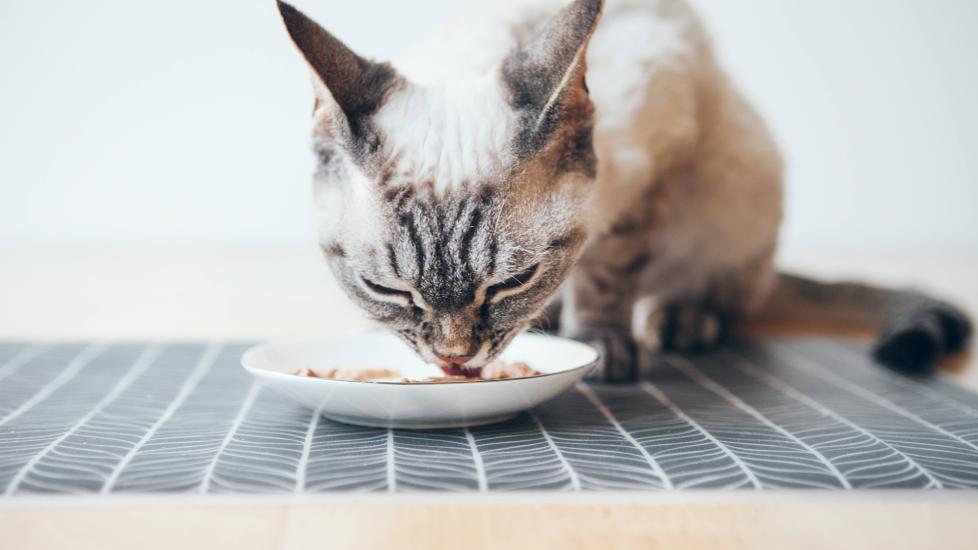Can Cats Eat Tuna?
Adobe Stock/veera
If you’ve noticed that your cat’s wet food contains fishy flavors like tuna, you might wonder if the tuna from your local grocery store is safe for sharing. So can cats eat tuna, or is this human-grade fish a bad choice for our feline friends? Here’s what to know before sharing.
Is Tuna Good for Cats?
Tuna, in small amounts, is a safe and nutritious treat for your cat. Just be sure the tuna is properly prepared (cooked and totally plain, with no oils or spices) and in a small quantity.
Tuna is high in protein and low in carbohydrates. It’s also rich in omega fatty acids, which improves cardiac health and helps your cat maintain a thick, rich coat. Many of the vitamins and minerals in this oily fish are also beneficial to our feline friends. But tuna is deficient in vitamin E, and this can cause serious problems when tuna is fed in large amounts.
Can Tuna Be Bad for Cats?
When cats eat too much tuna, it raises several concerns:
-
Tuna is very high in mercury, especially albacore tuna. The mercury levels are high enough that cats fed lots of tuna can develop mercury toxicity.
-
Tuna is rich enough in calories that too much can lead to obesity rather quickly.
-
Human-grade tuna is deficient in vitamin E, a critical vitamin cats need. If a cat’s diet becomes unbalanced with too much tuna, it can cause disease.
Because of these concerns, human-grade tuna for cats should be limited to a small, occasional amount. Tuna made specifically for cats is supplemented with additional ingredients to make it more balanced, so this can be fed without concern.
Can Cats Eat Canned Tuna?
Canned tuna is safe to feed your cat if it’s packed in water, not oil. The canned tuna should also have no spices or other flavorings added to it. It’s also best to avoid albacore tuna, which has much higher mercury levels than other forms of tuna.
Can Kittens Eat Tuna?
Kittens should not eat tuna. Kittens are much more sensitive to fluctuations in their diet, and they rely on a careful balance of nutrition to properly grow their bones and internal organs. They can also be more heavily influenced by exposure to toxins, including the mercury often found in tuna.
Because of this, it’s best to wait until your cat is at least 1 year old before offering treats like tuna.
How Much Tuna Can I Give My Cat?
Cats are drawn to the smell and taste of tuna—and if left to their own devices, they will overeat on this feline delicacy. But this can result in significant health problems, including steatitis (inflammation of the fat), myopathy (inflammation of the muscles), and mercury poisoning. For this reason, it is very important to limit tuna to the occasional snack.
Cats should be offered no more than 1 tablespoon of plain, unseasoned, cooked human-grade tuna, once a week. Kittens should not be offered tuna until after they’re at least 1 year old.
Tuna designed for cats to eat has been supplemented with additional ingredients, which makes it a more balanced food and acceptable for daily feeding without running the risk of disease.
Cats should be offered no more than 1 tablespoon of plain, unseasoned, cooked human-grade tuna, once a week.
How To Prepare Tuna for Cats
To prepare fresh tuna for your cat, cook it to human consumption standards without any butter, oils, or spices. Once thoroughly cooked, allow it to cool and cut it into bite-sized pieces. Restrict the amount to 1 tablespoon or less.
Alternatively, you can feed small amounts of plain canned tuna to kitty as well with the same guidelines. You can even consider a small dollop of tuna as a topper in your cat’s food bowl!
Other Foods To Feed Your Cat
Other fishy favorites for your cat include cooked haddock, cod, and shrimp. You can also safely share plain cooked chicken, turkey, or beef. For most cats, a well-cooked animal-based meat protein is almost always a safe bet for a snack.
Always talk to your veterinarian before introducing a new food to your cat’s diet.
